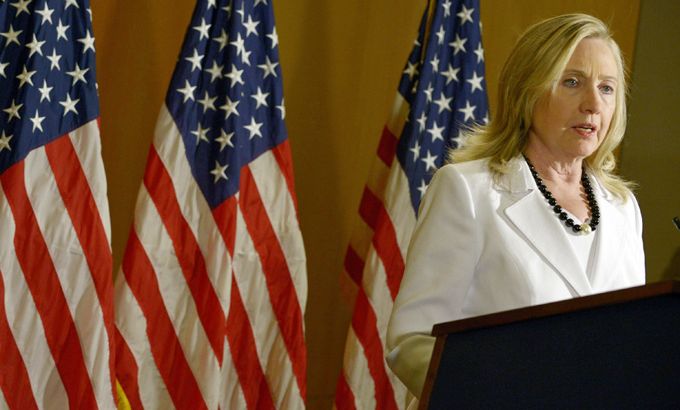Egypt and Iran top Clinton’s agenda in Israel
US secretary of state urges Israeli leaders in Jerusalem to see the Arab Spring as a “time of opportinity”.

Egypt’s political transition, Iran’s nuclear ambitions and other regional issues were on the agenda as US Secretary of State Hillary Clinton met Israeli top officials in Jerusalem.
After meeting President Shimon Peres on Monday, she urged Israel to treat the Arab Spring as an opportunity as well as a source of uncertainty convulsing the Middle East.
“It is a time of uncertainty but also of opportunity. It is a chance to advance our shared goal of security, stability, peace and democracy along with prosperity for the millions of people in this region who have yet to see a better future,” she said.
Clinton flew into Israel from Egypt, where she became the most senior US official to meet newly elected President Mohamed Morsi, from the long-banned Muslim Brotherhood.
For three decades, Israel’s security was in part defined through its peace treaty with Hosni Mubarak’s Egypt. Mubarak’s ouster last year has raised questions in Israel over the future of the treaty and Egypt’s military co-operation with Israel.
“I think that for the last thirty years the fact there was peace between us and Egypt saved the lives of hundreds of thousands of young people in Egypt and Israel and this is a worthwhile cause,” Peres said.
For her part, Clinton said “there is no going back” on the treaty. Morsi had told her on Saturday that Egypt would abide by its treaties.
Clinton also told Israeli officials that the US will use its power to keep Iran from acquiring nuclear weapons, and keep raising the pressure on Iran as long as it fails to come clean on its disputed uranium enrichment programme.
“Iran is under greater pressure now than ever before,” she said. “We will use all elements of American power to prevent Iran from obtaining a nuclear weapon.”
The veiled threat came as the US and Israel debate how best to deal with Iran’s nuclear programme. The US is seeking more time for negotiations and sanctions, while Israel has repeatedly hinted at military action.
Both suspect Iran may be aiming toward producing nuclear weapons, a claim Iran denies.
Clinton said, however, that everyone prefers a diplomatic resolution, and that Israel and the US were “on the same page” regarding Iran.
“Iran’s leaders still have the opportunity to make the right decision. The choice is ultimately Iran’s,” she said, adding that so far Iran’s proposals have been “non-starters”.
Clinton also spoke about the need to halt Syria’s violence and underscored America’s support for Israel throughout her day of meetings, during which she met Prime Minister Binyamin Netanyahu, Defence Minister Ehud Barak, and Foreign Minister Avigdor Lieberman.
In a departure from the usual pattern for senior US diplomats, she did not travel to the Palestinian Authority’s West Bank seat of government in Ramallah.
The Palestinians said a visit was unnecessary because Clinton had met the Palestinian president, Mahmoud Abbas, just a few days earlier in Paris.
“Peace among Israel, the Palestinian people and all of Israel’s Arab neighbours is crucial for Israel’s long-term progress and prosperity,” Clinton said.
Clinton met Palestinian Prime Minister Salam Fayyad, but she could not report any progress towards an accord that might secure an independent Palestine and an Israel at peace with its neighbours.